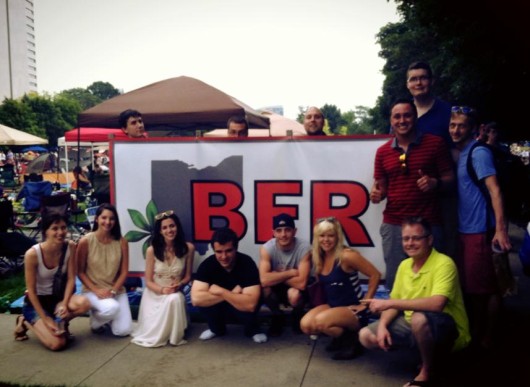
Members of the Collegiate Recovery Community at a 4th of July celebration.
Credit: Courtesy of Sarah Nerad
The scene on the lawn of the Wilce Student Health Services Center Saturday was that of a typical football tailgate. Ohio State fans decked out in scarlet and gray played cornhole and tossed a football, ate pizza and laughed and talked over the booming music and shouts of “O-H.”
The only difference was the plastic cups were filled with Coca-Cola instead of beer, the bottles only contained water and the most sought-after drink did not have a trace of alcohol.
“We (had) tons of coffee,” said Sarah Nerad, the organizer of the tailgate. “Coffee is very important for people in recovery.”
Ohio State’s Collegiate Recovery Community, a program for students in active recovery from drug or alcohol addictions, held its first sober tailgate before the OSU game against Indiana for students and other members of the recovery community.
“It’s really important to be part of the culture of being a student, and unfortunately for someone in recovery, that usually includes alcohol,” said Aaron Budd, a sixth-year in sexuality studies and a member of CRC. “So it’s great that we can create our own space within that activity.”
Nerad, a graduate administrative assistant at the Student Wellness Center and the founder of Ohio State’s Collegiate Recovery Community, knows first-hand what it is like to be sober in college. Nerad, who became sober at age 17 after struggling with an addiction to drugs and alcohol, was a member of a student recovery community at Texas Tech during her time as an undergrad.
Currently working on her master’s in social work and public administration at OSU, Nerad formed the CRC last spring. The group has grown to 33 students who are in active recovery from drug or alcohol addiction.
“We just want to provide a place for students in recovery to thrive academically and personally,” she said.
The group holds meetings weekly to discuss recovery, and Nerad also holds an on-campus Alcoholics Anonymous meeting, but said it is also important to host fun events for the members, like the tailgate.
“We’re not going to do recovery stuff (at the tailgate), because the students, that’s not always what they want,” she said. “They also want a college experience.”
Nerad said about 40 people attended the tailgate Saturday.
The RPAC, the Office of Student Life and Student Health Services, which collectively supplied the space for the tailgate, breakfast and coffee, tables, chairs, tents and a PA system, sponsored the event. Jet’s Pizza and Coca-Cola also donated food and drinks. Nerad said she estimated the cost of the event to be about $4,000.
Budd said he, like many students in recovery, want to take part in traditional college events but is wary of the temptation they bring.
“A tailgate, it’s a drinking event. And people that used to drink, we used to go to these events, and they used to be fun,” he said. “So what are people going to do when they don’t want to drink but want to have fun?”
Budd said he began struggling with drinking in college soon after he came out to his friends and family. He said his drinking “didn’t start as a downward spiral” but it kept progressing until he realized “drinking all the time didn’t feel good.” He tried at first to control his drinking, and when that didn’t work, he decided he needed to be completely sober. He joined different recovery groups on campus, and was one of the first members of the CRC.
Budd has now been sober for eight months, and the CRC has given him a place to “check in” and talk about his recovery while making close friends who understand what he is going through. He said those who have struggled with addiction know what it’s like to be “depressed and really low,” but once he entered recovery, he developed a new outlook on life.
He said there are more positives to a sober tailgate than many students might think.
“It’s more fun because you remember it, you won’t be hungover, and you can have a good time with really good friends,” he said.
Nerad said the tailgate was not only for members of the group or even just for those in recovery, but was open to anyone who wanted to celebrate without alcohol.
Katie Holloway, a fourth-year in human development and family science and an intern with the CRC, said she still had a good time without drinking.
“It’s a unique mix of age ranges and people here, and I’m happy they’re all able to connect,” said Holloway, who has a history of addiction and recovery in her family. “Drinking usually surrounds football, but we can still enjoy the tailgate experience without drinking.”
Nerad, Budd and Holloway all said they hope the CRC can continue to hold tailgates next year, and that these kind of events could draw in more students in recovery and help lower the negative stigma that can surround young people in recovery.
“We’re normal college students,” Budd said. “These are just really good people who are really passionate about this group.”


